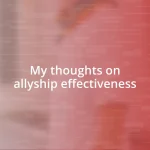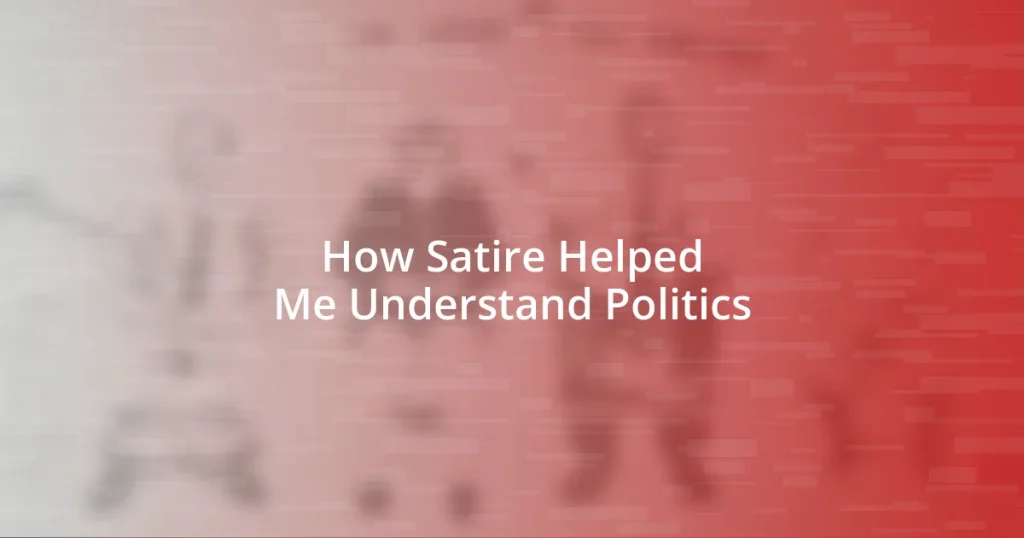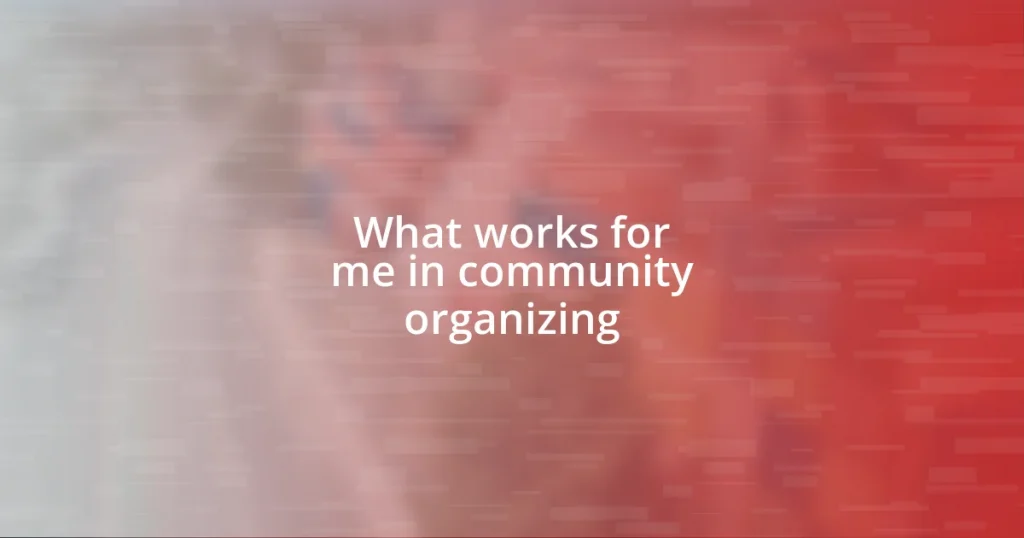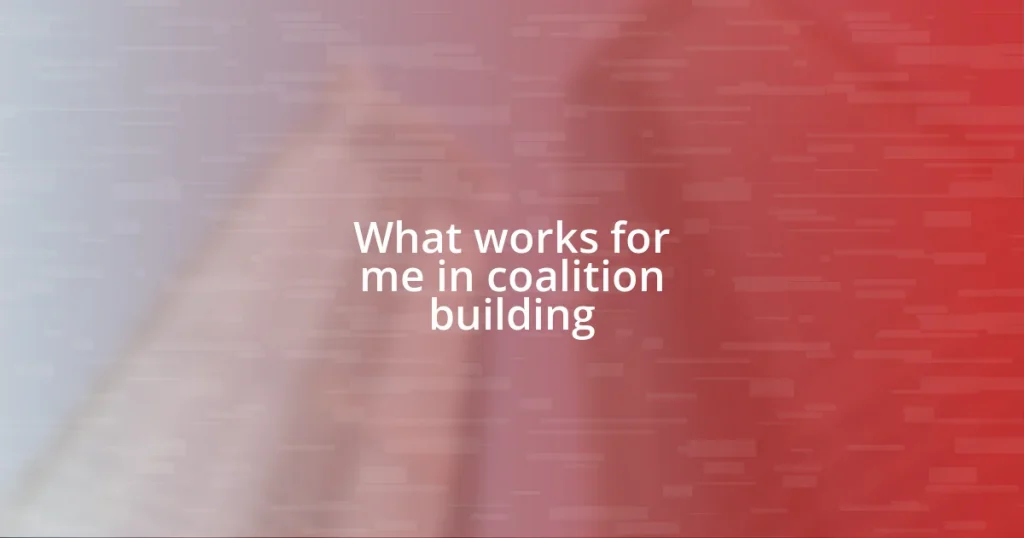Key takeaways:
- Satire simplifies complex political issues, making them relatable and promoting deeper understanding and critical thinking among audiences.
- Throughout history, satire has served as a powerful tool to challenge authority, encourage civic engagement, and provoke meaningful discussions about governance and societal norms.
- Humor in satire fosters community, empowers dissenting voices, and can spur individuals to take action, transforming laughter into a catalyst for political involvement and advocacy.
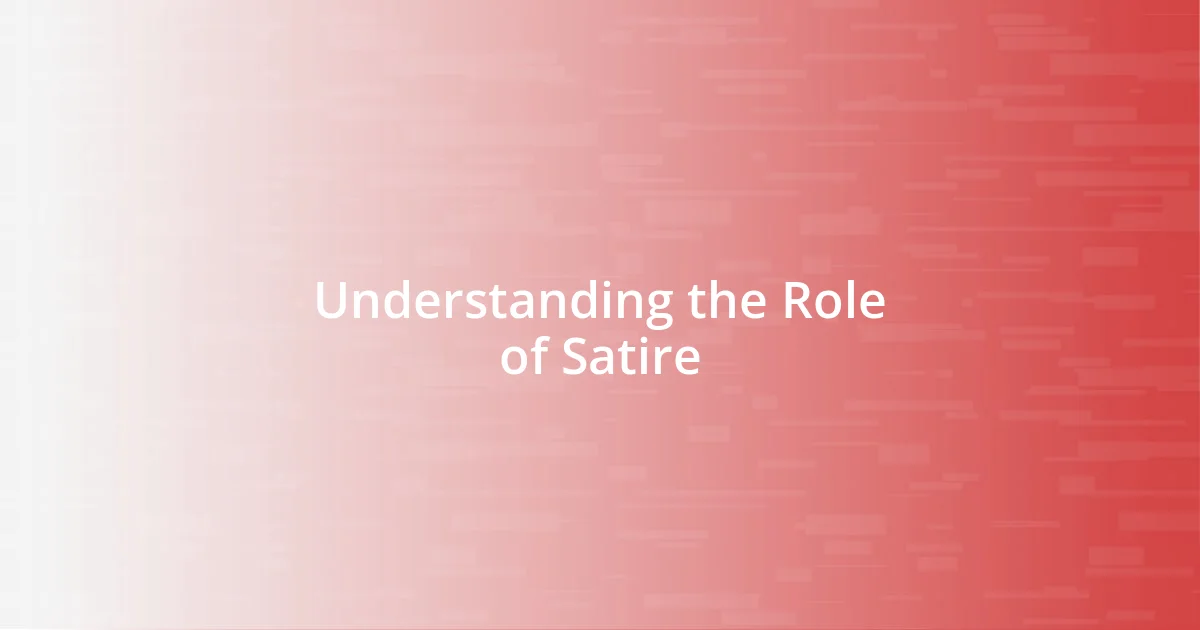
Understanding the Role of Satire
Satire plays a crucial role in shaping our understanding of politics, often serving as a mirror reflecting society’s flaws and absurdities. I vividly remember watching a satirical show that poked fun at a prominent political figure. It made me realize, in an almost comical way, how easily we can be swayed by rhetoric rather than facts. Have you ever found yourself laughing at something, only to discover there’s a deeper truth hidden beneath the humor?
By stripping away the complexities of political discourse, satire distills issues down to their essence, making them more digestible for the average person. I once discussed a particularly biting skit with friends, where the absurdity of a political decision was highlighted so outrageously that it forced us to confront our own naivety. Isn’t it fascinating how laughter can often lead to a more profound contemplation of serious topics?
Moreover, satire can challenge authority and encourage critical thinking. I recall feeling a wave of empowerment when a comedian eloquently criticized government policies. It prompted me to question why we accept certain norms without scrutiny. What if more people embraced this form of critique? It could spark meaningful discussions about accountability and activism in our political landscape.
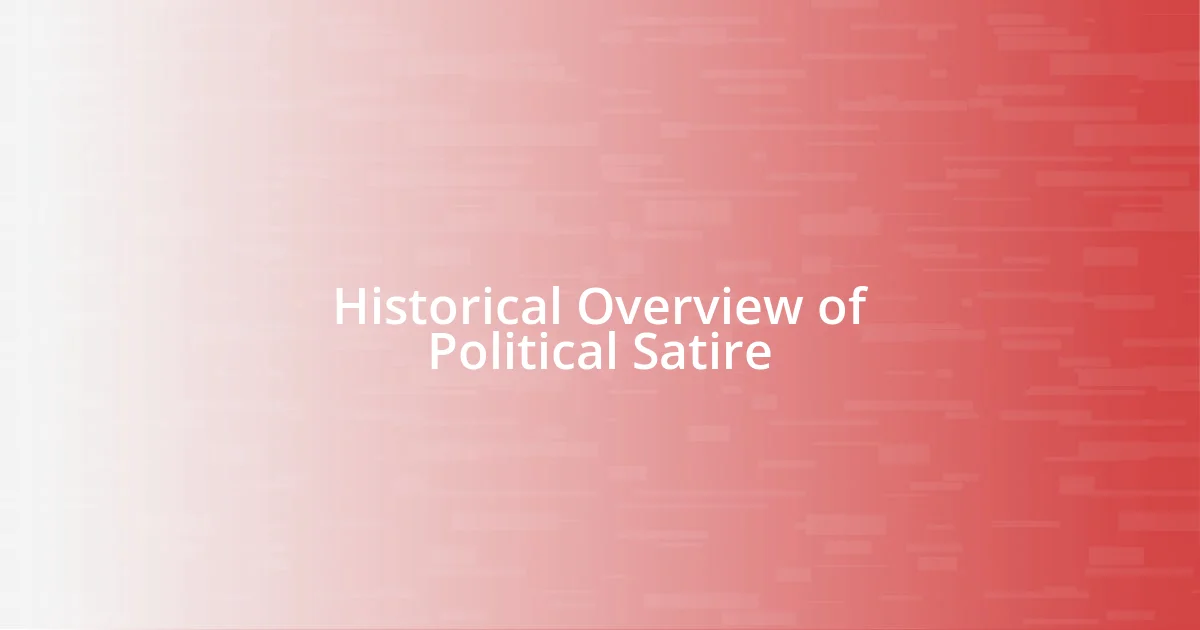
Historical Overview of Political Satire
Political satire has a rich and varied history, dating back to ancient times where playwrights and poets used humor to critique leaders and societal norms. I remember being taken aback when I learned about Aristophanes, a Greek playwright who boldly mocked political figures in his works. His plays not only entertained but also sparked conversations about democracy and governance among his audiences, revealing the power of laughter as a political tool.
- Satirical works like “The Rape of the Lock” by Alexander Pope in the 18th century offered not just humor but sharp insights into the political and social issues of the time.
- The 20th century saw the rise of political cartoons, with artists like Thomas Nast using their craft to take a stand against corruption and injustice.
- Modern platforms like “Saturday Night Live” or “The Daily Show” echo this tradition, where they dissect current events with humor, compelling viewers to think deeply about the state of politics.
Stories from these periods highlight how comedy can serve as a form of resistance, and I find it fascinating to connect those historical threads to how we engage with satire today. It’s almost a comforting thought that for centuries, humor has been a way to wrestle with the weightiest of subjects, allowing us to share a laugh while provoking critical thought.
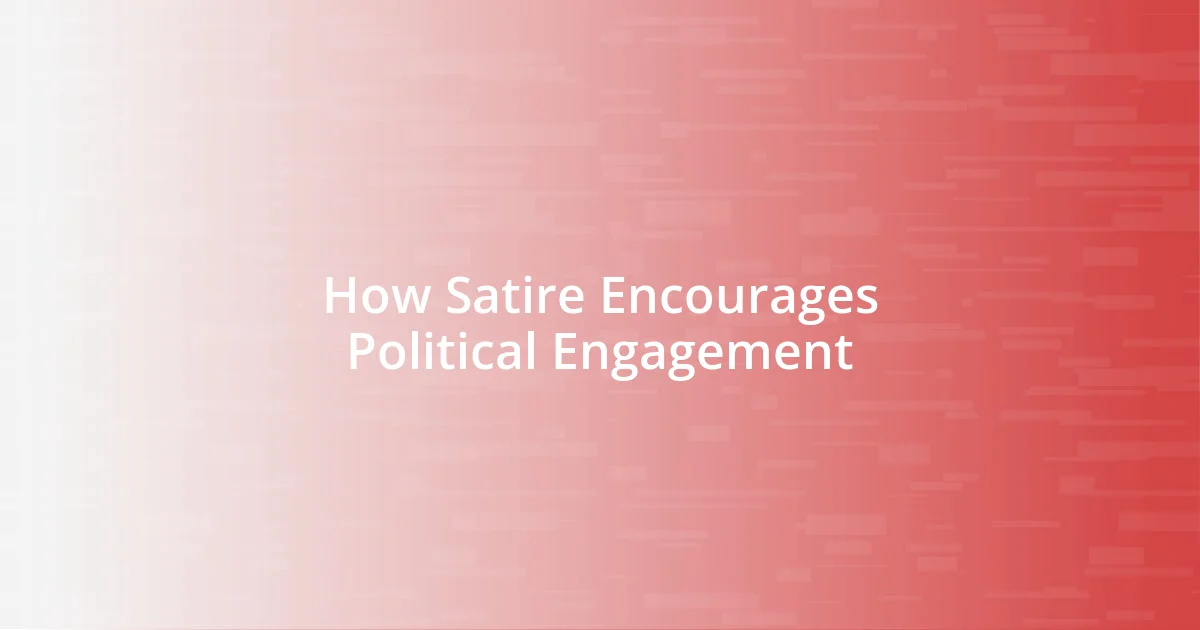
How Satire Encourages Political Engagement
Satire can really stimulate political engagement by transforming complex issues into relatable content. I remember stumbling upon a satirical video during a late-night binge—you know, one of those videos that had me chuckling yet perplexed about the absurdity of our political maneuvers. It struck me how the humor could not only entertain, but also spur an eagerness to learn more about the issues at hand. Have you ever felt a sudden urge to dive deeper into a topic after a good laugh? It’s that curiosity ignited by humor that can lead us to become more informed citizens.
Additionally, I’ve noticed that satire often creates a sense of community among viewers. After watching a classic political comedy skit, I found my social media feeds flooded with friends sharing their thoughts, interpretations, and even memes. It was thrilling to see how a single piece of satire could ignite discussions, encouraging us all to articulate our opinions and engage in debates we might have otherwise avoided. Have you shared a funny meme only to end up in a deep conversation about its implications? That’s the unique power of satire—it brings people together over shared laughter, leading to meaningful conversations about politics.
Lastly, satire uniquely empowers individuals to voice their dissent. There have been moments when I felt compelled to comment on a political issue after watching a funny segment that highlighted its ridiculousness. For instance, after seeing a comedian parody a controversial law, I couldn’t help but pen an opinion piece about it. I realized how this blend of humor and outrage could fuel advocacy. Have you ever felt that spark to take action after a humorous critique? It’s fascinating how laughter can galvanize our voices into advocating for change.
| Aspect | Example |
|---|---|
| Emotional Engagement | Humor spurs curiosity about complex issues. |
| Community Building | Shared laughter leads to lively discussions. |
| Empowerment | Humor encourages individuals to express dissent. |
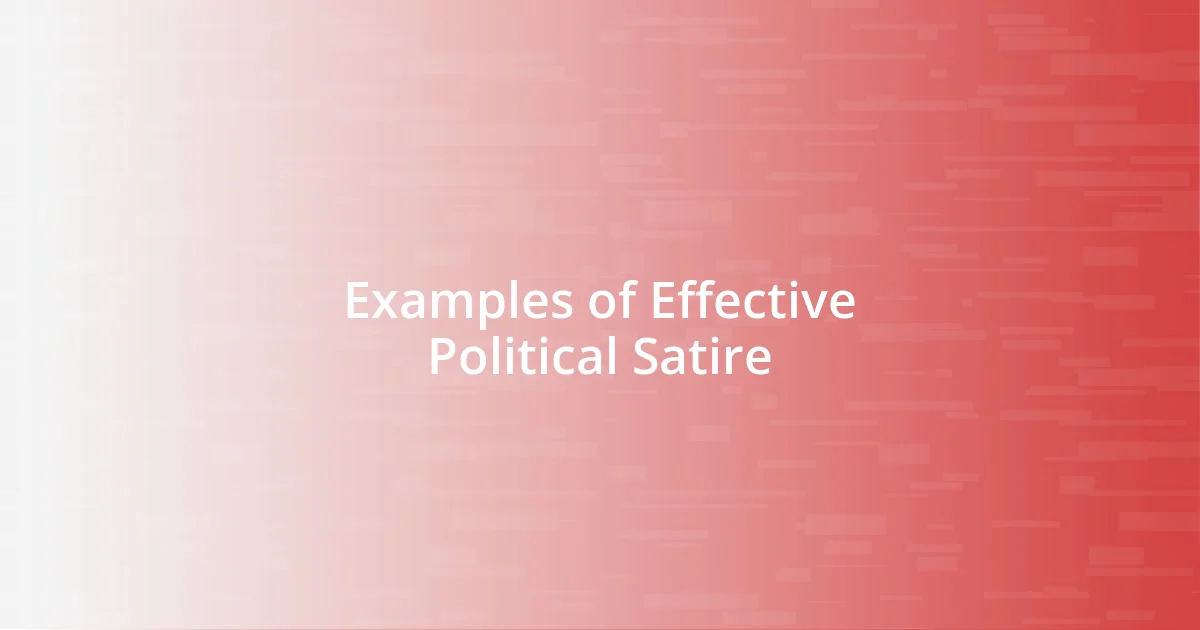
Examples of Effective Political Satire
One brilliant example of political satire that stands out to me is John Oliver’s segment on “Last Week Tonight.” I vividly recall watching an episode dedicated to voter ID laws, where he used clever graphics and biting humor to peel back layers of misinformation. It struck me how he transformed a dry, complex subject into something relatable, making me question the motives behind such laws. Have you ever felt the sudden weight of realization while laughing at something that seemed trivial? That’s the magic of Oliver’s approach.
Another effective form of political satire can be found in the comic strips of Garry Trudeau’s “Doonesbury.” I recall being a college student and flipping through the campus newspaper, where a single strip captured the absurdity of political debates with laser-sharp wit. These snippets not only brought laughter but also packed a punch, compelling me to reconsider political narratives I had previously accepted without question. It’s funny how a couple of drawings and some well-placed words can provoke such profound thoughts, isn’t it?
Lastly, I can’t forget the impact of “Saturday Night Live” sketches, particularly during election seasons. There was a moment when I found myself doubled over with laughter watching Kate McKinnon impersonate Hillary Clinton. It was wild to see how humor allowed me to reflect on real political dynamics while completely entertained. Did you ever find yourself laughing at a sketch only to realize how much it echoed your frustrations? It’s this blend of humor and reality that resonates deeply, reminding us that satire is more than just laughs; it’s a mirror reflecting our political landscape.
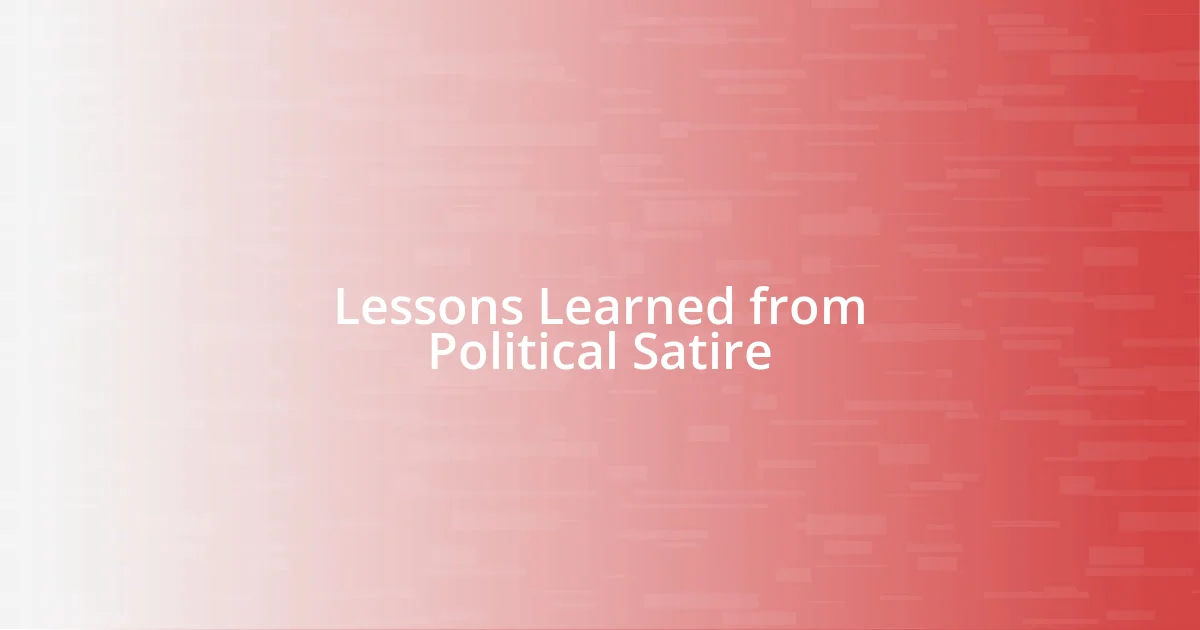
Lessons Learned from Political Satire
One lesson that resonates with me from political satire is its power to unveil uncomfortable truths. There was a point when I was watching a satirical show tackle the issue of corruption in politics, and I couldn’t help but chuckle at how they laid bare the ridiculousness of certain practices. It made me reflect deeply on the integrity of our leaders. Have you ever found a hidden truth hidden beneath layers of humor? It’s eye-opening how laughter can disarm us, allowing us to digest serious critiques that we might otherwise brush aside.
Additionally, satire has a unique ability to sharpen our critical thinking skills. I recall watching a segment that dissected misleading campaign promises. The comedic take on these promises was not only funny but also forced me to question the sincerity behind them. It made me wonder, why do we sometimes accept political rhetoric without a second thought? This kind of engagement—from laughter to skepticism—encourages us to analyze what we hear more carefully. Doesn’t it feel empowering to scrutinize the messages we receive rather than passively accept them?
Moreover, political satire often challenges the status quo, prompting a reassessment of societal norms. I remember catching a skit that hilariously critiqued the media’s role in sensationalizing news. It was a lighthearted yet biting commentary that led me to rethink how we consume information. Have you noticed how satire can flip our perspectives in unexpected ways? This ability to make us reconsider everyday truths is what makes satire not just amusing but also essential in shaping our political consciousness.
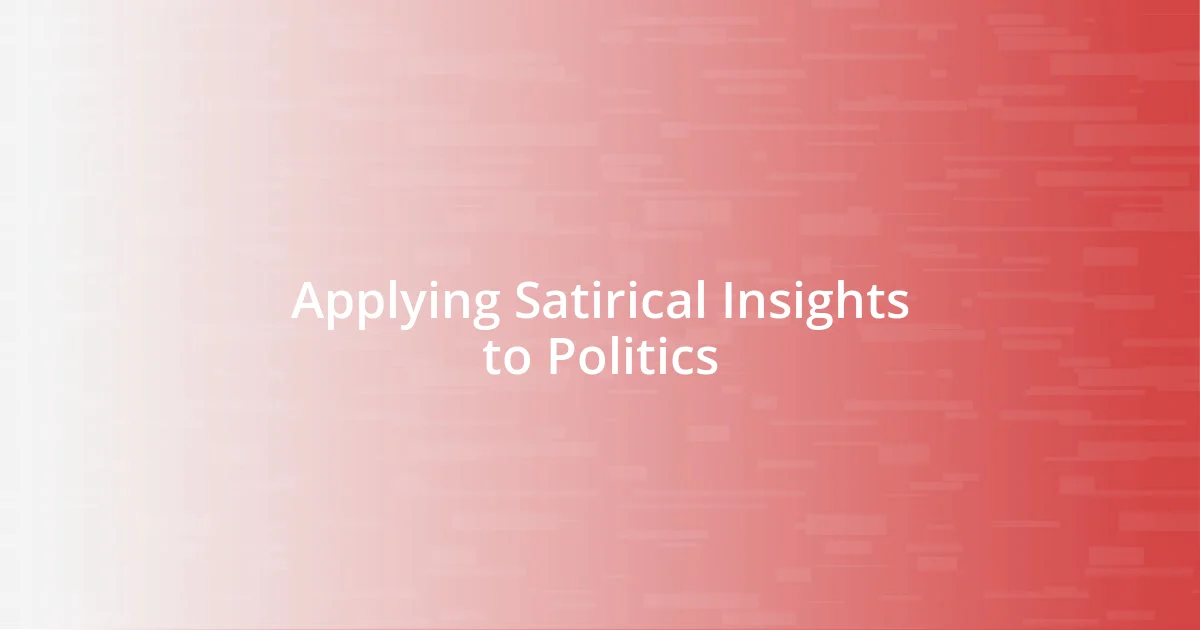
Applying Satirical Insights to Politics
Applying satirical insights to politics has a way of transforming the mundane into the eye-opening. For instance, I remember an evening when I was watching a satirical news show cover a recent scandal. The comedian’s take was so absurd that I found myself laughing out loud, but underneath the humor was a sharp critique that made me really ponder the implications of the scandal. Have you ever laughed while feeling a sense of dread about what was being discussed? It’s an odd combination, but it’s what makes satire such a powerful tool for understanding political dynamics.
I often think about how satire equips us to engage with difficult topics more comfortably. There was a time when I stumbled upon a meme making fun of a political figure’s tweet, and it struck a chord with me. Instead of being infuriated, I ended up sharing it with friends, sparking a lively discussion that opened the door to deeper conversations about the figure’s actions. It really hit me how humor can act as a bridge, allowing us to discuss serious issues while maintaining an element of lightness. Have you noticed how a good laugh can sometimes create a safe space for frank discussions?
Not only does satire provide a lens to focus on the absurdities of politics, but it also encourages a more active form of involvement. A time comes to mind when I watched a documentary that featured satirical critiques of government policies. It demanded my attention and made me want to contribute, even in small ways, to discussions around those policies. That feeling of urgency to be advocates for change is something I believe is fostered through these satirical observations. Isn’t it fascinating how a joke can inspire action and provoke thought just as effectively as a serious debate?







